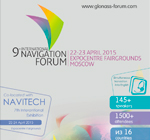President of NP "GLONASS": Chine expresses interest in ERA-GLONASS system

22 April 2014
The day before the International Navigation Forum the president of the NP "GLONASS" Alexander Gurko told RIA Novosti about the development of one of the main partnership's projects - the accident emergency response system "ERA-GLONASS", about interest expressed by foreign colleagues in it and about plans for the upcoming conference. The International Navigation Forum will take place in Moscow on April 23 for the 8th time. The strategic partner of the Forum is the NP "GLONASS". This is a large-scale event covering the entire range of solutions, technology systems, equipment and services of the navigation, information and communication industry, which will be co-located with the Navitech Exhibition.
The day before the Forum the president of the NP "GLONASS" Alexander Gurko told RIA Novosti reporters about the development of one of the main partnership's projects - the accident emergency response system "ERA-GLONASS", about interest expressed by foreign colleagues in it, about alternative opportunities of the system and about plans for the upcoming conference.
Alexander Gurko, NP "GLONASS" is the only implementer of the project on the creation and introduction of the state accident emergency response system "ERA-GLONASS". At what stage is the system's development and introduction now?
The ERA-GLONASS Project was started in 2009, when it was approved by the Russian Presidential Commission for Modernization and Technological Development of Russia's Economy. The first contract was in May 2010. Over this period of time the the regulatory system was formed, last year the Federal Law "About the ERA-GLONASS System" was passed that came into force on January 1. Last year, in January there were amendments made to the Technical Regulations of the Customs Union "About the Wheeled Vehicle Safety", in accordance with which, starting next year, the cars sold in Kazakhstan, Belarus and Russia shall be equipped with a device or a system meeting ERA-GLONASS requirements in order to be certified. Starting 2017 these requirements will be applied to all vehicles being sold for the first time in the three countries.
In December 2013 the system was turned over to the state customer - the Ministry of Transport of Russia, put into operation, this year the system is being introduced. The terms are changed: Starting January 1, 2015 the system has to be put into commercial operation and function throughout Russia.
Starting next year you will be able to receive ERA-GLONASS services, not waiting for 2017 and the purchase of a new car. In order for that you need to buy a terminal that supports ERA-GLONASS, to have it installed at a certified center and to connect to the system.
As for the ERA-GLONASS infrastructure. It is a combination of the navigation & information platform and the telecommunication subsystem, which allows transferring information from a car to a call center, and, after the primary filtering of false and true calls, sending the information to the 112 system or (and) to emergency services systems.
How does it determined whether the call was false?
The ERA-GLONASS system is automatically activated in case of a severe accident, when an airbag trips out and acceleration sensors show a great overload. Or it is activated, when the driver pushes an alarm button to inform about some traffic incident, it doesn't matter whether it happens to him/her or to someone else close by. In any case the information about the incident goes to contact centers of the ERA-GLONASS system.
These contact center serve as a filter and run primary diagnostics of the incident. The operator directly contacts an accident victim or the person starting the alarm and clarifies circumstances of the accident and the call to cut off false signals. The ERA-GLONASS terminals obligatory have a speaker and a microphone in order for the operator to be able to communicate with a driver or a passenger of the car that the call came from.
After primary processing the information is transfered to the 112 system. The 112 system is a dispatching service, it provides the responding by MOI, EMERCOM and the ambulance. To help accident victims only the squads located not far go to the accident place.
How long does it take for the information to be processed through ERA-GLONASS and for the emergency squads to come to the accident site?
In accordance with the ERA-GLONASS system standard the date transfer shall take not more that 20 seconds. A thousand test calls made show that the message averagely goes for 10 seconds. It means twice faster.
Our task is to transfer information about the accident. The response itself, its terms and regulations are established by the regulatory system of the interaction between MOI, EMERCOM and the ambulance. In each region of Russia the response time is different, because there different distances and traffic conditions. In general the ambulance and police squads shall averagely arrive in 15-20 minutes after the call is relieved.
What are the development prospects of the ERA-GLONASS emergency response system?
There are several directions for the system development.
The first one is to improve the service coverage. This is the work of mobile network operators on improving the radio coverage and the application of satellite communications in remote and underpopulated regions.
The second direction is to provide VAS services based on ERA-GLONASS. The goal is to reduce a load on the federal budget, as well as to promote the development of the market of GLONASS technology-based services. These are insurance telematic services, distant vehicle diagnostics, road user information, assitance on the road, towing service, etc.
These works are in the development trend of the automotive industry.
Don't other CIS countries plan to participate in the system, besides Russia, Belarus and Kazakhstan?
As for the other countries, I hope they will join. Now the regulatory system of the ERA-GLONASS is only related to countries of the Customs Union. Recently Armenia announced its joining the CU.
On April 18 in Russky Island there was a meeting of the Russian-Chinese Commission - there we also discussed this issue. We think that ERA-GLONASS has an export potential as a complex system of solutions and services. We offer other countries to join our system and to build an equivalent system with our assistance.
Do you mean a joint enterprise/production?
Yes, this was proposed - to create a working group and later, probably, a joint provider of services based on such a system. Chinese colleagues were very interested in our experience and asked to tell them about the ERA-GLONASS system.
In this case we overran Europe. While creating the system we used experience of Brazil, where they also built their state system but for some other purposes. Their system is primarily for registering vehicles, preventing hijacking and searching.
Our colleagues from the European Union also helped us analyze technologies and standards - our task was to ensure interoperability of Russian and European (eCall) systems.
We want to solve the similar objective in the Eurasian space - to create a single uninterrupted transparent zone for services of responding and assisting on roads of China and countries bordering with us in the East.
What is the main difference between the Russian ERA-GLONASS system and its foreign analogues? What is its advantage?
I have already told about the difference of the Brazilian system. In the European Union the disadvantage of the system, in our opinion, is its inconsistency.
Because 27 countries can not come to their final agreement on a single technical policy, there is synchronization missing, there is too much "democracy". The systems in different countries are organized in different ways: Somewhere these are private data-centers, somewhere these are local EMERCOM centers. It is difficult for them to harmonize organizing and business models for commercializing these structures. Thus, they started much earlier than us - in 2004, but according to their plan the work will be completed in 2017. 15 years!
In this sense it is easier for us - we are one country. Let us compare what we have in our case: The idea - September 2009, the system's readiness and regulatory base - December 2013. Four years!
Moreover, there are many innovative solutions applied in ERA-GLONASS: For example, the telecommunication network is created in the format of Full MVNO.
This is a virtual operator that is connected to all main mobile operators, working in Russia. This ensures a high reliability and the best communication service coverage. We worked out pilot systems of high accuracy positioning in Bashkortostan and Leningrad Region. These systems provide accuracy of up to several centimeters that is important for traffic accident cases and insurance products, where they need high accuracy and legal compliance of the information.
We have a backup SMS channel that Europe doesn't have. We understand that we don't have a high level of GPRS or 3G signals everywhere, thus there, where the signal is weak, there is a technical opportunity to transfer emergency call information by means of an SMS message.
Do you plan to integrate LTE 4G into the system?
While designing the system we allowed LTE support, but we understand that the real coverage of this technology is small, and it will take several years before it is introduce to regions. Moreover, the emergency calls, having small amount of information transfered, don't necessarily need the high-speed LTE connection.
What additional services on the basis of ERA-GLONASS are possible?
The system operates in all subjects of Russia, this allows providing services for state, corporate and private users throughout Russia.
Now we are implementing several state initiatives in the transport industry. This is a system of tolling heavy vehicles for the passage of federal highways. A system of tachograph control that in perspective should become an on-line system. A system of controlling the transportation of dangerous cargo and passangers All these and other systems are potential users of the ERA-GLONASS infrastructure. Of course, on the commercial basis.
Did you propose Moscow Parking to cooperate in paying for parking space? The users often complain about the chargeable parking system in Moscow not being adjusted, the payments going poorly, not always possible extension of parking time via SMS.
Yes, it is one of the possible applications. A car is equipped with a navigation receiver and a communication modem ex post. The information about the car's location and parking time "from and to" can be directly transfered to the chargeable parking system. Of Course, if the motorist agrees, because this is a chargeable service. And sending SMS (several ones) is chargeable too. But our offer is more convenient for a user - one-two clicks, and there is even no need to look for a plate with the parking lot phone number.
The service of transferring an emergency call to the ERA-GLONASS system is always free for everyone. But it is provided only at the moment of an accident, we wish this situation never happens.
The operator doesn't know and cannot know where a car is located until the accident happens or the driver pushes the alarm button.
In case of the activation of VAS services - there are contractual relations between a motorist and an operator. In the framework of these relations the motorist agrees to provide navigation information to the operator.
This week there will be the Navitech Exhibition and International Navigation Forum. What are the key topics for discussion at the Forum?
The Navigation Forum traditionally brings together navigation specialists and users, government authority representatives from different countries.
This is an event of the international level, accredited with the UN. The conference itself will take place for the 8th time, and the Navitech Exhibition - for the 6th time. Every year the Exhibition grows for 20-30%, this is a very popular event in our field. This is the first place event in terms of its scale and level in Russia, EurAsEC countries and Eastern Europe.
The Forum will cover the results of last year related to the technology development, its application and regulatory base, hold round-tables and panel discussions. This year the special focus of the Forum will be on the consumer market and services for end-users. In this light we re-branded its attributes - website, portal, advertising materials.
The Exhibition also will focus on consumer services. At the NP "GLONASS" booth we will provide special space for startups in the field of navigation application in the consumer market, young companies will present new services. So, the Navitech Exhibition will undoubtedly be interesting for a wide circle of specialists and consumers of navigation products and services.
The source: http://ria.ru

































































